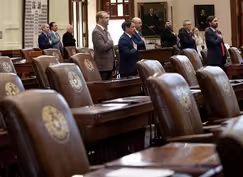
Can Trump deliver on his energy export promises?
Clip: 8/5/2025 | 6m 25sVideo has Closed Captions
Can Trump deliver on his energy export promises? Expert weighs in
With new tariffs set to take effect on Friday, President Trump continued to battle and negotiate with several countries. He has said the new purchase of U.S. energy is a key to some of the biggest deals struck so far. But there are questions about whether these pledges will live up to the president’s claims. Stephanie Sy discussed more with David Goldwyn of Goldwyn Global Strategies.
Problems playing video? | Closed Captioning Feedback
Problems playing video? | Closed Captioning Feedback
Major corporate funding for the PBS News Hour is provided by BDO, BNSF, Consumer Cellular, American Cruise Lines, and Raymond James. Funding for the PBS NewsHour Weekend is provided by...

Can Trump deliver on his energy export promises?
Clip: 8/5/2025 | 6m 25sVideo has Closed Captions
With new tariffs set to take effect on Friday, President Trump continued to battle and negotiate with several countries. He has said the new purchase of U.S. energy is a key to some of the biggest deals struck so far. But there are questions about whether these pledges will live up to the president’s claims. Stephanie Sy discussed more with David Goldwyn of Goldwyn Global Strategies.
Problems playing video? | Closed Captioning Feedback
How to Watch PBS News Hour
PBS News Hour is available to stream on pbs.org and the free PBS App, available on iPhone, Apple TV, Android TV, Android smartphones, Amazon Fire TV, Amazon Fire Tablet, Roku, Samsung Smart TV, and Vizio.
Providing Support for PBS.org
Learn Moreabout PBS online sponsorshipGEOFF BENNETT: With new tariffs set to take effect on Friday, President Trump continued to negotiate with several countries today.
The president of Switzerland flew to Washington in a late attempt to stave off tariffs of 39 percent on her country.
Earlier in the day, President Trump threatened to raise tariffs on India, saying he was upset over that country's purchase of Russian oil.
In fact, the president has said the new purchase of U.S. energy is key to some of the biggest deals struck so far.
But, as Stephanie Sy tells us, there are questions about whether those pledges will live up to the president's claims.
STEPHANIE SY: That's right, Geoff.
Energy agreements are a big part of the latest announcements.
Japan said it will invest $550 billion in American energy infrastructure and production.
And South Korea agreed to buy $100 billion in liquefied natural gas over the next four years.
But the deal really raising eyebrows is with the European Union, which apparently agreed to buy $250 billion worth of U.S. energy a year for the next three years.
David Goldwyn, a former top State Department energy official in the Obama administration, and now president of Goldwyn Global Strategies, joins me now to break all of this down.
David, so good to have you on the "News Hour."
There are people in your field who have crunched the numbers and they are calling this deal with the E.U.
unrealistic, even delusional.
Do you agree?
Can Europe buy that much American energy in that amount of time?
And can we export that much of it?
DAVID GOLDWYN, President, Goldwyn Global Strategies: Well, the short answer is no.
The numbers really are fantastical.
I think it's an aspirational agreement.
I think it's a strong political signal.
But the math really doesn't work.
The total U.S. exports of energy last year were $165 billion.
If we sent them all to Europe next year, it wouldn't approach $250 billion.
And commodity prices are lower in 2025 than they were in 2024.
And Europe itself, if they backed out all of all of Russian gas, that might be another it might be another $25 billion or $30 billion.
So you just can't get there from here in terms of the total numbers.
Europe would have to vastly increase its demand.
The U.S. would have to triple its exports.
And the reality is that Europe is working hard to reduce its dependence on hydrocarbons.
And at $65 oil, the U.S. oil sector is not growing.
So I think, from that point of view, it's impossible.
So I really think you can't get there from here either at $250 billion a year, not $750 billion in three years.
And even if Europe were to sign a 30-year take-or-pay contract, it wouldn't be delivered under a new agreement probably until starting in 2027 or maybe 2030.
So it's really politically impossible.
And by the time people find out, hopefully, we will be in a new administration.
STEPHANIE SY: I just want to unpack a few things you said there, David.
The president of the European Commission, Ursula von der Leyen, said they want to replace their purchases of Russian LNG for American supplies.
That is what Trump wanted.
Isn't that a good thing geopolitically, even if it is aspirational, if it sends a signal to Europe in the future to get its LNG from the U.S.?
And doesn't it also sort of suit the goal of President Trump, which is for us energy dominance?
DAVID GOLDWYN: Well, absolutely.
We are already - - the U.S. already exports something like 25 percent of Europe's LNG.
But Europe's total purchase of Russian hydrocarbons, a small amount of oil and the rest of it gas, was something like $64 billion.
So, if they only bought from the U.S., which would be a little risky for them, you still wouldn't be getting to $250 billion a year.
So, absolutely, it's a good signal.
But the reality is, since the Russian invasion of Ukraine, Europe has already been diversifying towards U.S. LNG.
And the question of whether they sign any long-term contracts has more to do with how long Europe thinks it's going to use gas and how much.
And so this is not going to happen faster than European political consensus will allow.
So it's absolutely important and it's already happening.
You just can't get it to $250 billion a year or $750 billion in three years.
STEPHANIE SY: When looking at the overall strategy, though, of negotiating these so-called deals with countries, most of which are U.S. allies, is this approach an overall win for U.S. consumers and the larger economy?
DAVID GOLDWYN: I don't think that it is.
I mean, first, for President Trump, these tariffs are successful and that he's raising an enormous amount of revenue.
And so that was his goal and that's happening.
But all of that is coming out of the pockets of the American taxpayers, so I don't really think it's a win.
Also, the president's tariff policy is a dagger pointed at the heart of his energy dominance policy, because first you're punishing your primary markets in Europe and Asia by making their economies weaker, making it harder for them to export their goods.
Second, you're creating an enormous amount of distrust by bullying your allies into a very transactional approach.
I mean, the Europeans have had plenty of the use of energy as a tool of coercion from Russia.
If the U.S. starts to look like it's going to grant or withhold supplies depending on what it gets for issues unrelated even to energy, then the smart move for countries in Europe and Asia is going to be to diversify away from the U.S.
So I think it's a very risky and destructive policy.
And the third thing is that the tariffs are making the U.S. energy production, steel for pipes, copper for wires, the price of commodity inputs like copper, the price of even oil that we get from other countries, which is refined to make gasoline, all of that is becoming vastly more expensive because of the tariff policy and it's undermining the energy dominance policy.
It's no surprise that U.S. international energy companies like Exxon and Chevron are having their worst stock performance in years, worse than ever happened under the Biden administration, because of where prices are and because of where the economy is.
So it's a very Pyrrhic victory.
STEPHANIE SY: David Goldwyn, president of Goldwyn Global Strategies.
David, thanks for sharing your perspective with us.
DAVID GOLDWYN: My pleasure.
Bangladesh faces uncertainty a year after PM's resignation
Video has Closed Captions
Clip: 8/5/2025 | 8m 7s | Bangladesh faces political unrest and uncertainty a year after leader's resignation (8m 7s)
How Trump's embrace of QAnon kept Epstein in the spotlight
Video has Closed Captions
Clip: 8/5/2025 | 7m 1s | How Trump's embrace of conspiracy theories kept the Epstein case in the spotlight (7m 1s)
Israeli hostage in Hamas video is a broken man, cousin says
Video has Closed Captions
Clip: 8/5/2025 | 7m 5s | Israeli hostage shown in Hamas video is starved, tortured and 'a broken man,' cousin says (7m 5s)
Mothers open up about worrying decline in mental health
Video has Closed Captions
Clip: 8/5/2025 | 7m 50s | Overwhelmed and stressed: Mothers open up about worrying decline in mental health (7m 50s)
New book documents motivation and development of atomic bomb
Video has Closed Captions
Clip: 8/5/2025 | 9m 7s | 'The Devil Reached Toward the Sky' documents motivation and development of the atomic bomb (9m 7s)
News Wrap: Texas AG attempts to expel Dems who left state
Video has Closed Captions
Clip: 8/5/2025 | 6m 31s | News Wrap: Texas AG attempts to expel Democrats who left state to block redistricting vote (6m 31s)
Providing Support for PBS.org
Learn Moreabout PBS online sponsorshipSupport for PBS provided by:
Major corporate funding for the PBS News Hour is provided by BDO, BNSF, Consumer Cellular, American Cruise Lines, and Raymond James. Funding for the PBS NewsHour Weekend is provided by...

















